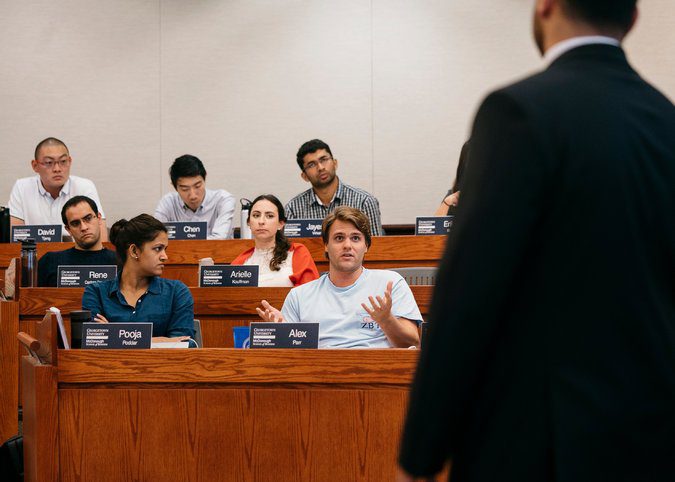More Harvard MBAs Are Turning to Politics

There’s no doubt that politics and public service have been hot topics since the November 2016 election. These subjects have dominated news stories and talk shows across the country. And, according to a recent report by the Wall Street Journal, politics and public service are also moving up as career choices for graduates from Harvard Business School (HBS).
Around 40 Class of ’17 HBS MBA graduates launched careers in government and nonprofits—twice as many as the previous year. Even though this represents just 4 percent of the program’s 900 graduates, it still suggests a growing interest in policy-making for business students.
Of course, business and government have always been closely connected, and it’s common for MBA students to aspire to public service and nonprofit involvement as part of their long-term career plans. The difference is that MBA graduates are starting to head into public service careers immediately after graduation. At least that’s what Matthew M. Segneri, an HBS MBA Class of 2004 alumnus, has witnessed.
Segneri, the director of the Social Enterprise Initiative at HBS, has noticed that graduates are increasingly considering careers in politics. In an article in the Harvard Crimson, he said: “Over the last 12 to 18 months, I’ve had a number of conversations with folks and seen a real uptick in the number of people who are thinking about local, state, and federal office.”
He went on to observe a change in the timing of these plans. “When you look at the prior generations of alumni there is more the tradition of learn, earn, and return—folks would go to school, have a successful traditional business career, and then later in life they would pursue public office or get deeply engaged in nonprofits and their communities,” Segneri said. “Today, there’s both an urgency and an understanding that it doesn’t have to be that way.”
There are many factors driving the surge in interest in politics. One is the simple fact that the United States elected a prominent businessman as president in the last election. Another is a trend of prominent business leaders being very vocal about politics in recent months, reinforcing the connection between the business and political realms.
For example, during the 2016 November election, Meg Whitman, the CEO of Hewlett Packard Enterprise Co., threw her support behind the Democratic candidate in New Jersey’s Fifth Congressional District race. And Carlos Diaz, a French entrepreneur in Silicon Valley, told the Financial Times that the tech industry has some responsibility for the 2016 election outcome.
YOU MAY ALSO LIKE: MBA Alumni Spotlight: HP CEO Meg Whitman
“The America that voted for Trump does not own a Tesla, nor an iPhone, and when it needs money, it does not ask business angels for help: it relies on bad credit,” Diaz said. “It is time to recognize that we need to develop technologies and businesses that will benefit the widest range of people possible, algorithms that do not divide but that bring together.”
So, it’s not a surprise that MBA graduates are heading into politics. In fact, more than a dozen Harvard MBA graduates have recently announced campaigns to run for local, state, or federal government.
Democrat Tim Keller, HBS MBA ’05, was elected mayor of Albuquerque, NM, last month while Republican Margaret Busse, HBS MBA ’01, recently announced her candidacy for the Massachusetts state senate. In addition, HBS MBA ’03 Sarah Amico is expected to announce her run for lieutenant governor in Georgia.
While Keller didn’t enter politics straight out of graduate business school, he understands why new MBA graduates are doing so. “In business school, what a lot of people do is say, ‘Oh, my second career is gonna be in public service. I’m gonna go into business, be successful, and then do public service,’” he told the Crimson. “What’s different all of a sudden is that people are opting out early, and they’re like ‘I’m gonna do this right now’ because they’re upset about something or fired up and want to make a difference.”
Adem T. Bunkeddeko, MBA Class of ’17, is currently running for Congress in New York’s Ninth Congressional District in Brooklyn—making him a perfect example of this phenomenon. Throughout his career at Harvard, Bunkeddeko maintained his connection to his local community and decided to use his business skills to better serve through politics. “At HBS we’re trained as general managers,” he said. “Understanding aspects of an organization, whether it be from the finance front or human capital, are important and useful skills that are actually quite lacking in public service today.”
And many other MBA graduates feel the same way. For Busse, who is running for the Massachusetts State Senate, the many case studies she read during her HBS coursework informed her desire to go into politics. “It’s really that ability to solve real-world problems that is needed in government today, that is needed in nonprofits today, and anywhere where people are trying to make a difference,” she said.
In addition, Busse sees widespread dissatisfaction with the current political climate as another reason MBA graduates are entering this arena. “I’m guessing a lot of people are feeling like me, frustrated with the current situation we have in politics today and feeling their skillset gives them a unique ability to help solve the problems we have right now,” Busse said.
In fact, that dissatisfaction led HBS MBA ’01 Daniella Ballou-Aares to recruit more HBS graduates into politics by forming the nonprofit Leadership Now with some of her fellow alumni. Developed after the 2016 election, Leadership Now recruits Harvard alumni and business leaders to run for office and helps to raise funds for their campaigns. After just a few months, the nonprofit already has the support of about 300 high-level business leaders.
Another example of HBS graduates encouraging public service is With Honor, which was developed by ’09 MBA Rye Barcott to support veterans running for office. In 2018, the organization plans to spend $30 million supporting campaigns for 25 to 35 congressional candidates.
In the end, Keller notes that the biggest motivation for MBAs to get into politics may be President Donald Trump. “Whether you like him or not, he is motivating. You’re either motivated against him or you’re motivated for him,” Keller said. “I also do think there’s just something about the millennial group that they’re not going to wait around.”
To learn more about how Harvard Business School facilitates students’ careers in politics, visit the school website.
This article has been edited and republished with permissions from our sister site, Clear Admit.
Top Schools Tackle Sexual Harassment, NFL Protests, and More

Should business schools teach ethics and social responsibility? In the past, top MBA programs stuck to a fairly typical curriculum: finance, marketing, accounting, economics. And while those topics still comprise the core of most MBA programs, they’re now only a part of the whole.
Beyond allowing MBA students to focus their studies in areas like entrepreneurship or technology, MBA programs are also taking on some of the most prominent ethical topics of the day, asking students to weigh in on current headlines and happenings. It’s the MBA ethics debate.
According to a United Nations group survey of business school students from around the world, students believe that ethics are a business’s most important responsibility. According to the report, “the exposure to, and teaching of, business ethics does not merely assist business leaders to resolve moral dilemmas. More importantly, it matures their proficiency in moral judgment and their ability to incorporate social issues in the decision-making process and assists them in implementing this in an all-inclusive manner.”
For example, last year a group of business executives—including the CEO of PepsiCo and head of General Motors—got together to dissolve two business councils that consulted with President Trump after insensitive remarks about the white supremacist violence that took place in Charlottesville, VA. And other executives such as the CEO of Patagonia, Yvon Choinard, have been vocal about political and ethical issues—even using their companies to take positions on social responsibility that would typically be considered outside the scope of business.
So, it’s no wonder many business schools have been making business ethics a more important part of their curriculum. The question is, “How should business ethics be added to the MBA curriculum, and how is it being added currently?” It depends on the school.
At Georgetown University’s McDonough School of Business, Professor Edward Soule teaches courses on business ethics, corporate social responsibility, and leadership. During these classes, he told the New York Times that he has assigned coursework covering a range of trending topics including sexual harassment at Uber, social justice protests by N.F.L. players, and how companies like Amazon have responded when attacked by President Trump.
“Something has changed,” Soule said. “I would be kidding you if I told you there wasn’t a different vibe in the classroom. Ethics and values have taken on more significance. It has to do with all of the things going on in this administration, often things that challenge our understanding of ethics and leadership.”

Students discuss the recent NFL protests in Prof. Ed Soule’s class at Georgetown’s McDonough School of Business. Photo via Justin T. Gellerson for The New York Times.
Georgetown McDonough is also home to the Institute for the Study of Markets and Ethics (GISME), a center that examines the ethical issues inherent in the functioning of a market society. Students, faculty, and researchers who participate in the center explore ethical questions as they relate to business and bring ethical considerations to bear on policy decisions regarding the regulation of markets. These are especially salient issues for Georgetown McDonough given its Washington D.C. location.
“At the McDonough School of Business, we have developed a method of teaching business ethics that includes normative experiential learning, communicates in terms readily understood by business students, and involves actual ethical decision-making on the part of the students,” Michael Douma, assistant research professor and director of GISME, said in a news release. “We have found that our approach results in students being more invested in the course and more committed to resolving ethical issues that confront them in a business environment.”
Another example can be found at Carnegie Mellon’s Tepper School of Business. According to John Hooker, a professor of operations research and business ethics and social responsibility, ethics has been a part of the Tepper School curriculum since the 1990s. “Our program was apparently the first to introduce the topic (1966), as part of a course on business law,” Hooker told us. “The ethics presence has gradually increased over the years, but we ethics faculty often have to fight for it. My view is that a required ethics course should be part of the picture.”
And Leanne Meyer, co-director of the Accelerate Leadership Center at the school, told the New York Times, “There’s a turning point in what’s expected from business leaders. Up until now, business leaders were largely responsible for delivering products. Now, shareholders are looking to corporate leaders to make statements on what would traditionally have been social justice or moral issues.”
As for ethics and MBA students, Tepper’s core offering in Ethics and Leadership is one of the only second-year courses it requires its students to take. The course teaches students how to foster their ability to reason and how to handle the ethical implications of managing organizations and people.
“The basic lesson for MBA students is that business ethics is not optional,” explained Hooker. “It is the basis for the social infrastructure that makes business possible, much as engineering is the basis for physical infrastructure. It requires careful analysis and training, no less than engineering or finance. This is why we need a stand-alone ethics course. Business ethics training teaches us to do ethics with our brains rather than rely on gut feelings. Otherwise, we have no way to reach consensus on the ground rules.”
In the end, there are many options for MBA students interested in ethics, though ultimately it up to the students themselves to raise topics that are pressing to them. “Ethics courses often focus on the hot topics. This stimulates discussion and raises course ratings, but it generates more heat than light,” said Hooker. “I focus on issues that students themselves raise. I also emphasize cross-cultural ethics, because business is global, and norms vary enormously around in the world. U.S. students typically have little awareness of this.”
Whether through case studies, guest speakers, simulations, competitions, or another initiative, the leading MBA programs dive into business ethics and corporate responsibility using a range of approaches. To learn more about Professor Hooker’s approach to ethics, you can check out his blog: Ethical Decisions.
This article has been edited and republished from our sister site, Clear Admit
Wharton MBAs Will Get You Out Of The Social Media Bubble

The social media bubble has many definitions but perhaps could more accurately referred to as an echo chamber. As in, we are only listening and reading to precisely what we want to hear. That could sound innocent to those who preface cat videos and YouTube mixtapes, but often in the political sense it leads to unabashed biases going unchecked. Continue reading…
Business and Political Strategy Aren’t So Different, According to Columbia

There may be a fine line between how successful business and political campaigns lay out strategies, according to a new Columbia Business School article.
Continue reading…
Rutgers Sets Up Mentoring Program in Vietnam

Rutgers Business School recently published an article by Susan Todd about Assistant Dean Sangeeta Rao’s June visit to the Ho Chi Minh National Academy in Hanoi, Vietnam, where she ran an intensive three-day training program on mentoring.
